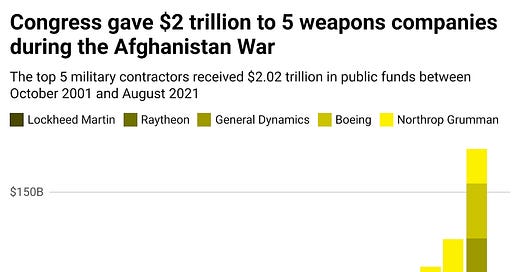The top 5 military contractors ate $2 trillion during the Afghanistan War
Speaking Security Newsletter | Advisory Note for Organizers and Candidates, n°106 | 23 August 2021
If you find these notes useful, you can support this newsletter here and SPRI, here. Sharing these newsletters also helps. Thank you!
*A big Thank You to Lisa and Dad_Bob, the latest members of SPRI’s donor community. Please consider joining Lisa and Dad on Patreon, here, to help us align US policies ideas with working-class interests. Thank you!
*I was on a podcast last week. Check it out here.
Situation
There was a clip going around Twitter last week of Julian Assange speaking in 2011 on the ‘real’ purpose of the Afghanistan War. Here’s Assange: “The goal is to use Afghanistan to wash money out of the tax bases of the US and Europe and back into the hands of a transnational security elite. The goal is an endless war, not a successful war.”
The invasion and subsequent 20-year occupation was considerably less conspiratorial than Assange makes it sound. But you can’t argue that the transfer of wealth he’s talking about never took place. The chart below is meant to express that.
N.B.: The top 5 federal contractors are all military contractors. They eat around a fifth of all federal contract dollars and about a third of all Department of Defense (DOD) contract dollars annually. The following figures refer to all federal contracts, but the overwhelming amount of public capital these firms get through contracts come from DOD and not civilian agencies.
-Years are in fiscal years. October 2001 = first quarter of FY2002.
-Data for FY2004 and FY2005 come from the source (SAM.gov) as the other years (except for so far in FY2021, which comes from USAspending.gov) but through a different portal due to missing data. Therefore, these figures are likely underestimates.
-Data jump from FY2019 to FY2020 likely due to advanced or expedited contract payments as part of the federal COVID relief efforts.
Thanks for your time,
Stephen (@stephensemler; stephen@securityreform.org)
Find this note useful? Please consider becoming a supporter of SPRI. Unlike establishment think tanks, we rely exclusively on small donations.




